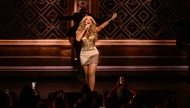
The Wright Brothers By David McCullough, $30.
Most people know that Wilbur and Orville Wright made the first powered-aircraft flight on December 17, 1903, but few know that only a week before, a better-funded flight attempt failed spectacularly. As veteran biographer David McCullough recounts in The Wright Brothers, Smithsonian Institution Secretary Samuel Langley, backed by funds from the War Department, had built the “Aerodrome,” which pitched into the Potomac River moments after launching.
“Not incidentally,” McCullough points out, “the Langley project had cost nearly $70,000, the greater part of it public money, whereas the brothers’ total expenses for everything from 1900 to 1903 ... came to a little less than $1,000, a sum paid entirely from the modest profits of their bicycle business.” You may conclude that private initiative succeeds while government-funded efforts founder, but that’s not McCullough’s point. If it was on the Wrights’ minds at all, they never said so. Although they were leery of Langley’s interest in their work, they defended him publicly as a fellow flight pioneer.
Many would-be aviators were at work on the problem of powered flight, and the Wrights had written others, including Langley, for information and advice. What distinguished their efforts was the Wrights’ focus on controls that adjusted to the wind’s irregularity. With that in mind, they managed to live for months at a stretch at desolate Kitty Hawk, North Carolina, where they tested gliders for two seasons before attempting motored flight.
Still, in McCullough’s genial telling, two plucky brothers succeeding where favored others had failed is appealing. Neither was a high school graduate, but both were articulate, cultured and wise about business and publicity. After the Aerodrome debacle, the War Department was leery of the Wrights, so they investigated offers from other nations. Wilbur spent a year in France, testing, flying and training French pilots—and frequenting the Louvre. When the U.S. government finally came around, Orville conducted highly popular test flights in Washington, including a crash that nearly killed him.
Their younger sister Katharine, a Dayton schoolteacher, often shared the limelight with her brothers. More influential was their father, Milton, a Protestant bishop who not only encouraged his sons but imparted to them modesty and probity. McCullough notes that Parisian women found Wilbur attractive, but he said he was too busy for romance. If either brother had a sex life, he managed it with great care, and that it does not matter is actually refreshing.
Find more Chuck Twardy at chucktwardy.com.







